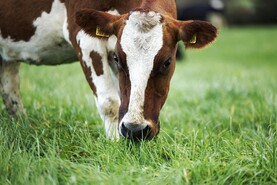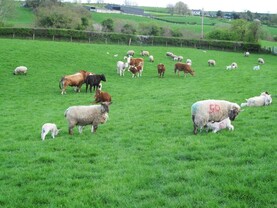The French, unlike the Irish, consume a lot of their own home-produced dairy product – soft cheeses, yogurts, etc. They are not as dependent on exports like Ireland.
However, the closure of all hotels, cafés, etc, has changed the French consumption model overnight. Now, supermarkets and retail are almost the sole supplier of dairy products.
Similar to what we have seen in the US and parts of the UK, this means there is an imbalance with high demand at supermarket level, but other traditional routes to market abandoned, at least for the moment. In some places in France, there is surplus milk available that has no home.
Plan
With this in mind CNIEL, the umbrella organisation for the French dairy industry, milk producers and processors, set up a plan. It devised a scheme to reduce milk production and compensate farmers rather than produce the milk and have to dump it.
CNIEL created a fund of €10m from its members and is aiming to pay this out to processors and farmers that want to partake in the initiative if they have been affected by COVID-19 restrictions.
With the help of the IFA’s intrepid French translator Catherine Lascurettes, I talked to CNIEL director general Caroline Le Poultier about the scheme and what it was aiming to achieve.

Caroline le Poulter, CNIEL, France Managing Director.
Q1
Caroline, briefly outline the initiative. My understanding currently is - a pot of farmer levy funding has been set aside to compensate farmers for under-production in April. This pot of money will be matched by EU funding. Am I correct?
No, the money will not be matched by the EU. It is just the funds we create from our own resources. However, we do have to apply to the European Commission for permission to activate Article 222, because what we are doing is distorting the market, it’s anti competitive, so we need clearance for this initiative. Other countries have asked for similar schemes. We are still waiting for permission as we speak. It’s private money only.
Q2
What will be the size of the fund and what does that equate to in terms of volume reduction? How big is that relative to the projected problem in France during that period?
The peak of production in April is about 3.3% over what is produced in March and it equates to about 64 million litres in April. That is the additional volume above March. With our fund, it's €10m and with that we hope we can reduce this additional April volume in half. That’s 32m litres if we pay €320 per 1,000 litres.
Q3
How will funds be distributed between the different processors/farmers given that it is a limited fund? Who gets first refusal, etc?
There is no application. It’s a dialogue between processors and farmers. The money will come from the processors to the farmers because it’s simple. They will notify the processor of the April 2020 volume compared with the April 2019 and pay compensation of the reduced volume. It’s a dialogue between the farmer and the processor. If they reduce, then they will be compensated, but only to a maximum reduction level of 5% per farm.
Q4
The fact that the pot of money is so small it will probably not be enough?
Yes, if there is more volume reduction than money, we will pay the same rate for the reduced volume. However, we are not expecting this, as there are a number of processors/farmers who already say they don’t want this scheme.
Q5
How have farmers accepted the initiative?
They understand it now, but it is a difficult measure to get across, because at the moment there is a contradiction in markets. There is big demand from the supermarket and retail trade, but that is a different market completely to commodity production.
Q6
Are there any other initiatives ongoing that will also limit production in April and May?
No – the only other measure we are seeking from the EU is private storage aid.
Q7
Do you think the EU will come with a volume reduction initiative at a later stage?
No, I don’t think they will encourage reduction of volume with EU funds. We hope however that they will agree to our demands for private storage aid.
The French, unlike the Irish, consume a lot of their own home-produced dairy product – soft cheeses, yogurts, etc. They are not as dependent on exports like Ireland.
However, the closure of all hotels, cafés, etc, has changed the French consumption model overnight. Now, supermarkets and retail are almost the sole supplier of dairy products.
Similar to what we have seen in the US and parts of the UK, this means there is an imbalance with high demand at supermarket level, but other traditional routes to market abandoned, at least for the moment. In some places in France, there is surplus milk available that has no home.
Plan
With this in mind CNIEL, the umbrella organisation for the French dairy industry, milk producers and processors, set up a plan. It devised a scheme to reduce milk production and compensate farmers rather than produce the milk and have to dump it.
CNIEL created a fund of €10m from its members and is aiming to pay this out to processors and farmers that want to partake in the initiative if they have been affected by COVID-19 restrictions.
With the help of the IFA’s intrepid French translator Catherine Lascurettes, I talked to CNIEL director general Caroline Le Poultier about the scheme and what it was aiming to achieve.

Caroline le Poulter, CNIEL, France Managing Director.
Q1
Caroline, briefly outline the initiative. My understanding currently is - a pot of farmer levy funding has been set aside to compensate farmers for under-production in April. This pot of money will be matched by EU funding. Am I correct?
No, the money will not be matched by the EU. It is just the funds we create from our own resources. However, we do have to apply to the European Commission for permission to activate Article 222, because what we are doing is distorting the market, it’s anti competitive, so we need clearance for this initiative. Other countries have asked for similar schemes. We are still waiting for permission as we speak. It’s private money only.
Q2
What will be the size of the fund and what does that equate to in terms of volume reduction? How big is that relative to the projected problem in France during that period?
The peak of production in April is about 3.3% over what is produced in March and it equates to about 64 million litres in April. That is the additional volume above March. With our fund, it's €10m and with that we hope we can reduce this additional April volume in half. That’s 32m litres if we pay €320 per 1,000 litres.
Q3
How will funds be distributed between the different processors/farmers given that it is a limited fund? Who gets first refusal, etc?
There is no application. It’s a dialogue between processors and farmers. The money will come from the processors to the farmers because it’s simple. They will notify the processor of the April 2020 volume compared with the April 2019 and pay compensation of the reduced volume. It’s a dialogue between the farmer and the processor. If they reduce, then they will be compensated, but only to a maximum reduction level of 5% per farm.
Q4
The fact that the pot of money is so small it will probably not be enough?
Yes, if there is more volume reduction than money, we will pay the same rate for the reduced volume. However, we are not expecting this, as there are a number of processors/farmers who already say they don’t want this scheme.
Q5
How have farmers accepted the initiative?
They understand it now, but it is a difficult measure to get across, because at the moment there is a contradiction in markets. There is big demand from the supermarket and retail trade, but that is a different market completely to commodity production.
Q6
Are there any other initiatives ongoing that will also limit production in April and May?
No – the only other measure we are seeking from the EU is private storage aid.
Q7
Do you think the EU will come with a volume reduction initiative at a later stage?
No, I don’t think they will encourage reduction of volume with EU funds. We hope however that they will agree to our demands for private storage aid.







 This is a subscriber-only article
This is a subscriber-only article








SHARING OPTIONS: